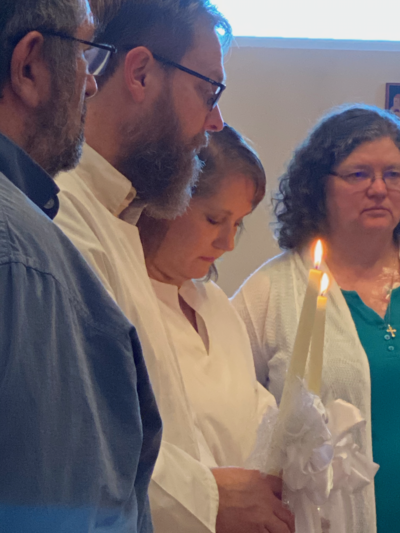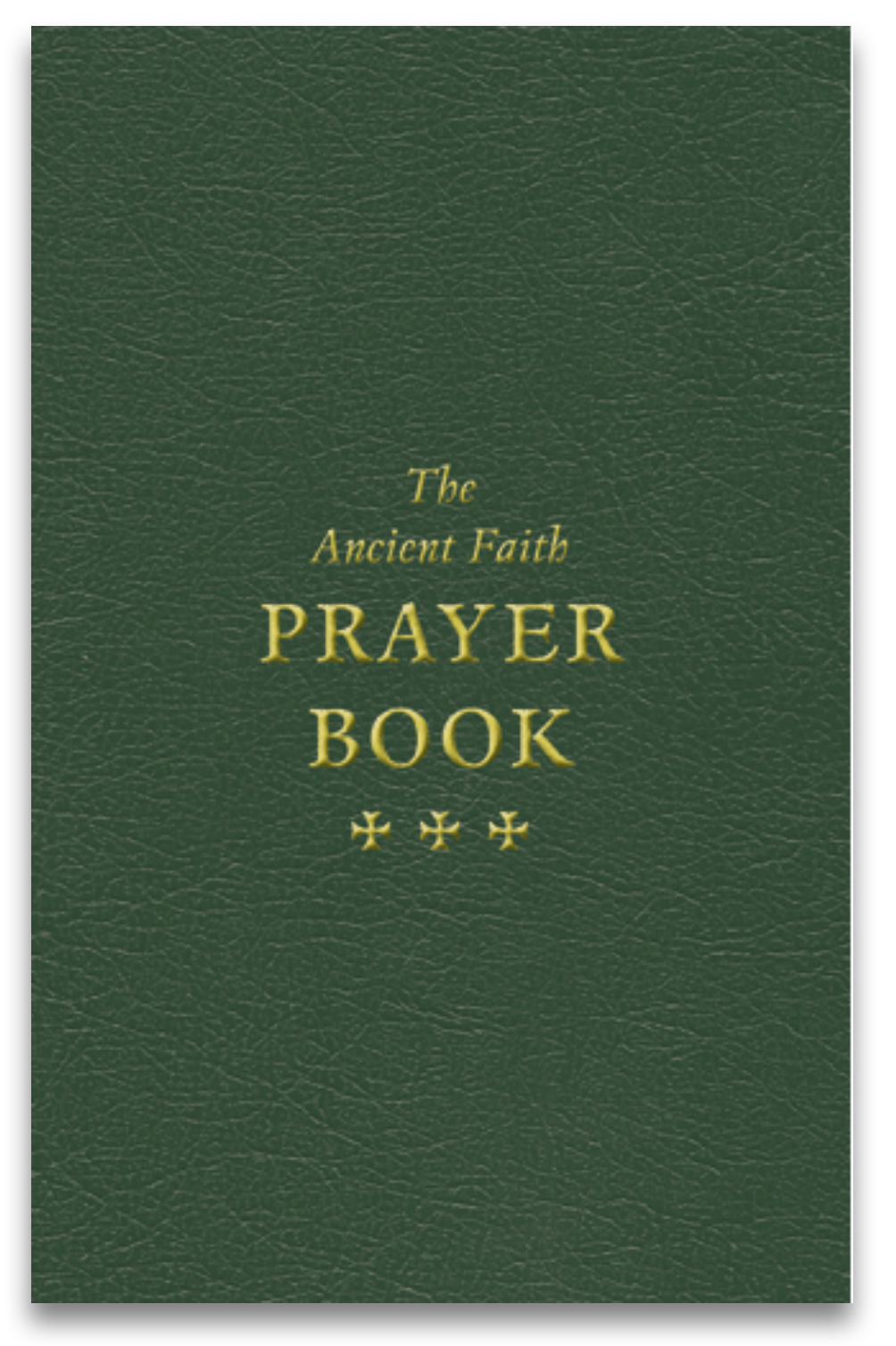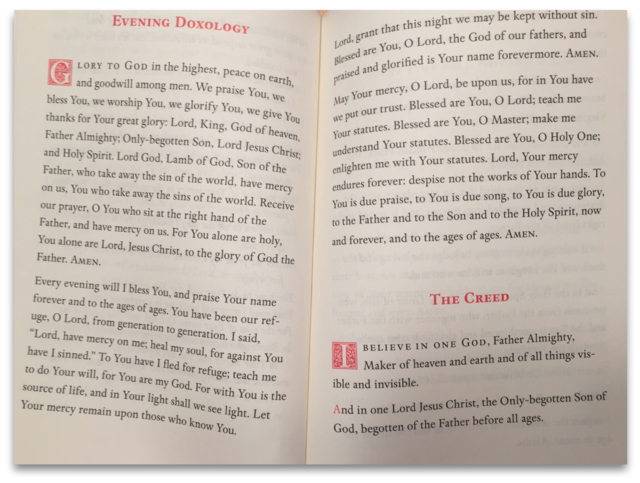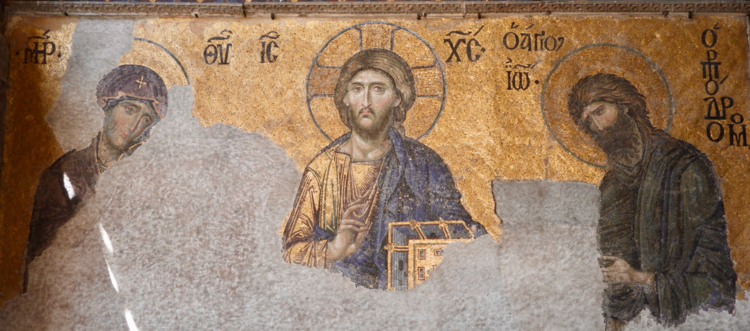 From my trip to Istanbul in 2018, inside the Hagia Sophia: The Deësis (δέησις: "intercession") Mosaic in the upper gallery. Christ Pantokrator (παντοκράτωρ: "Almighty") on the day of judgment with Mary on the left and John the Baptist on the right as they plea for his grace.
From my trip to Istanbul in 2018, inside the Hagia Sophia: The Deësis (δέησις: "intercession") Mosaic in the upper gallery. Christ Pantokrator (παντοκράτωρ: "Almighty") on the day of judgment with Mary on the left and John the Baptist on the right as they plea for his grace.
When I wrote the original “Why We Became Orthodox Christians” post earlier this year, I promised to go more in depth with the 7 primary reasons I outlined. Before I do that, though, I thought I would address a couple of comments I received from that initial introduction. Both of these comments came from Facebook—one in response to that initial blog post and one in response to something else I posted on Facebook a few days later.
The response to my post has been overwhelmingly positive. I’ve jokingly said for a couple of years now that I keep expecting to see a “Baptist Intervention Committee” show up at my door, but fortunately that hasn’t happened yet. One friend from back in the days of my childhood—someone who went to the same Baptist church I grew up in—commented on that Facebook post, “I didn’t even know there was an Orthodox Church!” As much as the Orthodox Church is such a huge part of my life, that kind of response can be startling; but admittedly, it’s not so surprising. When I grew up, I was taught that Christians were either Catholic or Protestant. Occasionally, I heard “Catholic, Protestant, or Baptist.” I’ll come back to those folks in a bit. Truthfully, though, I never heard of Orthodox Christians until I was an adult. And that may have even been because I took church history classes at a Baptist seminary. Therefore, it’s not surprising that the average person in the United States may not know anything about the Orthodox.
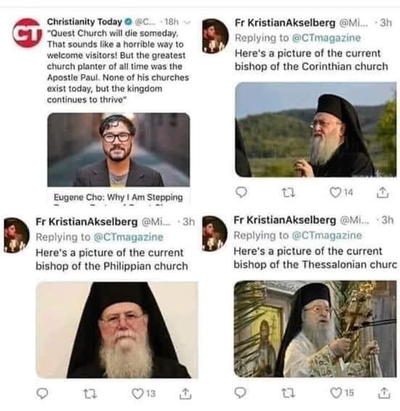 Click/tap for a larger viewAnother response came from a completely different post on FB in which I posted this collage of Twitter posts (I looked these up, and they were an actual exchange on Twitter). In the first post, a pastor made an offhand remark that his church would one day die just like all of the churches that the Apostle Paul founded. An Orthodox priest responded with photos of the bishops of the New Testament churches of Philippi, Corinth, and Thessalonica—churches which were founded by Paul and still exist to this day, churches that are and have always been Orthodox. A very good friend of mine, a Baptist pastor, responded that such a claim was as arrogant as those made in the early 20th century by J. M. Carroll, a Baptist pastor who wrote a little booklet called The Trail of Blood that tried to make the nonsensical and non-historical claim that Baptists had existed since John the Baptist in an unbroken trail of blood and martyrdom from the first century to today. It was all nonsense, but a lot of people believed it, even some down to this day who would suggest that there are Protestants, Catholics and Baptists.
Click/tap for a larger viewAnother response came from a completely different post on FB in which I posted this collage of Twitter posts (I looked these up, and they were an actual exchange on Twitter). In the first post, a pastor made an offhand remark that his church would one day die just like all of the churches that the Apostle Paul founded. An Orthodox priest responded with photos of the bishops of the New Testament churches of Philippi, Corinth, and Thessalonica—churches which were founded by Paul and still exist to this day, churches that are and have always been Orthodox. A very good friend of mine, a Baptist pastor, responded that such a claim was as arrogant as those made in the early 20th century by J. M. Carroll, a Baptist pastor who wrote a little booklet called The Trail of Blood that tried to make the nonsensical and non-historical claim that Baptists had existed since John the Baptist in an unbroken trail of blood and martyrdom from the first century to today. It was all nonsense, but a lot of people believed it, even some down to this day who would suggest that there are Protestants, Catholics and Baptists.
My friend objected that while there may be churches in those biblical locations today, there’s no way that could be in continuity with the ancient churches of the New Testament. J. M. Carroll made a historical claim about Baptists that could not be backed up with actual history. The Orthodox Church, however, can back up its claim and very much does. The Eastern Orthodox Church claims to be that actual church described in the Book of Acts, the very church that emerged from its roots in Judaism, and in fact, still carries many of those Jewish traditions today (a new day beginning after sunset, a new year beginning in September, feasts that often have roots in Jewish festivals, use of Psalms and incense in worship, liturgies that were adapted from earlier versions in Jewish worship, and much more).
I don’t blame the pastor on Twitter or my friend for assuming the ancient churches of the New Testament died a long time ago. In fact, as a Baptist Protestant, I made the same assumption back in the day. I’m sure I even taught that at various times. But the claim of the Orthodox Church is that it is the original church chronicled in the pages of the New Testament. The claim is not made that there aren’t Christians outside the Orthodox Church—such things are for God to determine—but we do have 2,000 years of historical records and a whole lot of church history to back up the historical claims we do make.
I realize that for some (such as my pastor friend who objected) that this is an audacious claim. It may even, in fact, sound arrogant. I don’t intend to come across that way, and no Orthodox believer with whom I am associated with voices any kind triumphal attitude. This doesn’t change the fact, though, that there are two millennia of church history that has taken place, and most Christians sadly know very little of it. Let’s be honest: the claim is not all that audacious when you really think about it. When I was a “good” Baptist, I thought we were correct over and against the Methodists and Presbyterians. The Pentecostals believe they’re right about spiritual gifts, and everyone else is wrong. There are many competing claims, but they can’t all be right.
Most Christians in the West are very unfamiliar with the Eastern Orthodox Church. These churches—Greek, Russian, Antiochian, etc.—were initially founded in the United States as ethnically-based congregations for immigrants, usually still practicing worship in old world languages. In the 21st century, though, things are changing. The church where we worship, St. Nicholas Antiochian Orthodox Church in Shreveport—holds its services completely in English and reflects a congregation of cradle-born Orthodox blended with new converts like Kathy and me.
There’s some irony here, too. In every church I’ve been a part of my entire life, we wanted to be exactly like the New Testament Church! Although I often thought to the contrary, I had really no idea what such a church would look like. I guess I assumed the early disciples sat in a circle singing praise choruses before Paul delivered long sermons—kind of like some groups today. I’ve known others who thought that through Christian movements that emphasized the Jewishness of early Christianity, they could find the New Testament Church. I’ll say it again, from the moment I stepped into an Orthodox Church, I was struck by the Jewish customs that were still there. It's been here among us all along.
Although we regularly attend St. Nicholas Orthodox Church in Shreveport, we’re temporarily living in Ruston, Louisiana—my hometown—while we’re waiting for our house to be built. There’s also an Orthodox mission church in Ruston—Holy Trinity Greek Orthodox Church—where I also attend services as often as I can. This past summer, Holy Trinity got their first full time priest: Fr. Brendan Pelphrey.
Before one of his first Sundays, Fr. Brendan offered this invitation on Facebook:
Did you know that ancient Christianity is a thing? It still exists in the Orthodox churches around the world. Today, many churches have opted for secularism as a way to teach about Christ, especially among young people; it's called "entertainment evangelism." But in fact, "God was in Christ reconciling the world to Himself"--not the other way around. Rock bands cannot teach the depths of prayer, silence, comfort, and oneness with God. The Orthodox Liturgy does. It's a meditation. Come and see!
Yes, ancient Christianity is still a thing. In the past, it was primarily in the East; but it has now made its way to the West and is growing. I haven’t even really begun to answer the question I posed in the title of this post. But if you’re interested at all in finding the answer, you should follow Fr. Brendan’s advice and “Come and see.”
Next: Coming soon, I’ll post the events surrounding my rejection of Calvinist/Reformed teaching that set me on this journey 25 years ago. Stay tuned.
 Tuesday, November 7, 2023 at 10:51PM
Tuesday, November 7, 2023 at 10:51PM  AHOS,
AHOS,  Accordance,
Accordance,  Eastern Orthodoxy,
Eastern Orthodoxy,  Kentucky,
Kentucky,  Logos,
Logos,  Louisiana,
Louisiana,  cancer,
cancer,  life in
life in  Personal
Personal 




